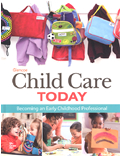
Child Care Today ©2012Chapter 9: Guiding Behavior and Social CompetenceChapter SummaryEarly educators play an important role in helping children build social relationship skills. It is important to nurture positive social traits in young children. Children must learn respect for others to develop socially acceptable ways to behave throughout life. Environments that feature group activities and foster friendships encourage social development. Teachers should coach social skills. Encourage activities among children that will stimulate conversation. Children must learn how to manage their feelings. Children’s experiences with different parenting styles can affect how they interact with others. Teachers must watch for signs of an unhealthy home life. A family’s beliefs, customs, and culture impact a child’s behavior. Encourage multigenerational families to discuss cooperatively how children should be raised. Teachers must think before they speak or act to properly guide children. Positive guidance tells children what they can do instead of what they cannot do. Expectations for children should be simple, clear, and age-appropriate. Children learn best by watching and imitating behaviors. Structure a schedule properly to head off behavior problems. Quiet and active play should be balanced, with consistent schedules and smooth transitions. Plan a wide variety of interesting activities. Arrange the classroom to keep toys within reach, and provide individual attention when needed. Limits help children understand expectations and acceptable behavior. Teachers use verbal and nonverbal techniques to guide children. There are many reasons for misbehavior. Avoid negative response methods. Biting is never appropriate and should be dealt with promptly. Ways to handle behavior problems include ignoring minor misbehaviors, offering choices, coaching appropriate behaviors, and distraction and redirection. Set consequences that are suitable for a child’s age and developmental level. Use positive reinforcement to reward good behavior. Withdrawal of privileges and cool-down moments can be effective guidance techniques. When resolving conflicts, avoid using labels and document any patterns or causes of behavior problems. |  |















